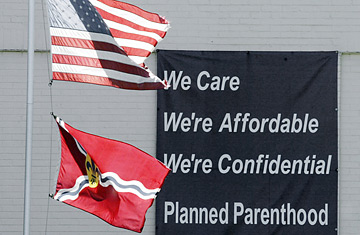
Flags fly near a sign at Planned Parenthood of the St. Louis.
For fifteen years, Planned Parenthood of Southwest Missouri clinics in Joplin and Springfield have offered free breast and cervical cancer screenings as part of the state's "Show Me Healthy Women" program. Now Governor Matt Blunt has announced that he will cut off all program funding to Planned Parenthood and redirect it to other health clinics. "Patients should not have to go to an abortion clinic to access life-saving tests," Blunt declared. Refusing to fund cancer screening at the clinics, he said, "ensures women may access important preventative care without contributing to abortion providers' goal of facilitating the destruction of innocent life."
Here's the twist: The clinics in question do not provide abortion services, though they will discuss the procedure and make referrals. "He was being dishonest," says Kellie Rohrbaugh, director of public affairs for Planned Parenthood of Southwest Missouri, who says her office received a fax alerting them to the funding cuts 45 minutes before the governor's press conference. "We asked the administrator of the program if women had complained about going to Planned Parenthood, and she said we'd been a very good partner. We could get people in quickly, have them seen, refer them to treatment quickly if they needed it."
This is about injecting politics into women's health, Rohrbaugh argues. But here's another twist. Blunt, the youngest governor in the country at 36 and the son of House Minority Whip Roy Blunt, is a decorated former navy officer who has long opposed most abortion. But he also supported the "Missouri Stem Cell Research and Cures Initiative," which was designed to promote "ethical stem cell research" but which critics denounced as allowing human cloning. That stance inspired Missouri Right to Life to declare that they no longer consider the governor an ally, and charge that he had "broken faith with the tens of thousands of pro-life volunteers around the state who helped elect him."
This is how it goes now. Planned Parenthood clinics lose money to help fight cancer because their parent organization has an image problem: Every time they have to step in to defend abortion rights, it reinforces the impression that that is their main mission. This makes them an easier political target, since overwhelming majorities of Americans favor access to contraception: a Wall Street Journal poll last summer found that 81% of Catholics and 75% of born-again Christians favored providing access to birth control as a way to reduce the need for abortion.
Meanwhile the Governor who cuts the funds himself is slapped for compromising on stem cell research — even though some staunch abortion opponents have more textured feelings about where to put up the guardrails around research. One ABC news poll found that only half of all opponents of legal abortion oppose stem cell research. Blunt may want to think twice about playing the politics of guilt by association.
